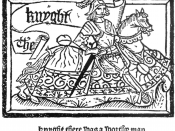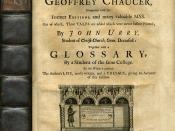"The Canterbury Tales" by Geoffrey Chaucer
A Personal Reaction to Peter Ackroyd's "Modern Retelling" vs Chaucer
As I read through what is considered the most faithful interpretation of the traditional text of The Canterbury Tales as edited by F. N. Robinson I noticed striking contrasts from the "modern retelling" that I read by Peter Ackroyd. Many authors have undertaken the task of re-writing Geoffrey Chaucer's work since the 14th century. Each interpretation brings something new to the piece, but none is quite as wild as Ackroyd's rendition. Robinson notes in the preface of his version of The Canterbury Tales-which is accompanied by a few annotations and explanatory devices-that his mission was to "supply the reader, either in the notes or in the glossary, with all necessary help for the understanding of the text" (Robinson xii). In contrast, Ackroyd states in his introduction that he believed his "task was essentially to facilitate the experience of the poem-to remove the obstacles to the understanding and enjoyment of the tales, and by various means to intimate or express the true nature of the original" (Ackroyd xxii).
Though it is understandable that there are inequalities between the English language spoken in medieval England and the English language spoken in 2009 America, it is still surprising that the differences in the writing style and narration of both Chaucer's and Ackroyd's The Canterbury Tales create two separate meanings to the text.
Ackroyd's version of the General Prologue alone presents many examples of the differences in Ackroyd's and Chaucer's language and prose. Ackroyd makes several deletions of some antiquated words and medieval spellings, such as "bifill" (Chaucer 19), "corage" (Chaucer 22), and "everichon" (Chaucer 31). This helps to make the story more intelligible to a reader unfamiliar with such words; however, this is perhaps the only necessary...


